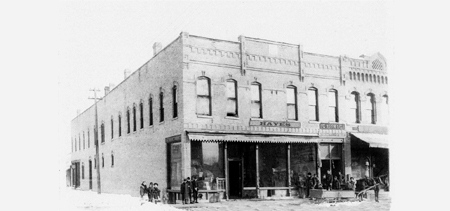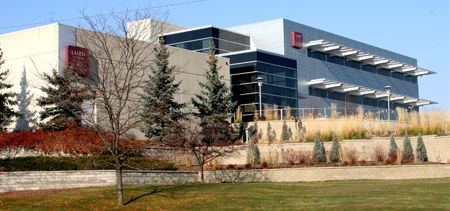![]()
History of the Marshfield Clinic Research Foundation
 Research has been an integral part of Marshfield Clinic’s mission since its inception in 1916. In a 1916 Marshfield Herald article, one of the Clinic's founders said:
Research has been an integral part of Marshfield Clinic’s mission since its inception in 1916. In a 1916 Marshfield Herald article, one of the Clinic's founders said:
“…the real aim of the organization is to give better and more efficient service to the public and to be able to compete with the medical centers of the larger cities.
"Each member of the firm, besides his usual work, will do reading and study in a special field. He will thus gain more expert knowledge by reason of such study, and will, through this extra knowledge, assist and help his colleagues in diagnosing especially difficult cases.
"In the course of time we will all be better doctors and will give better service. We will be more efficient. That is all there is to it."
Marshfield Clinic founders hosted scientific meetings for substantial numbers of other doctors, a tradition that was to endure and further shape the Clinic’s character. By 1924, Marshfield Clinic had become a formal part of the University of Wisconsin’s first medical preceptor program. The commitment to medical research and education would only increase.
Stephen Epstein, M.D., established the roots of today’s Marshfield Clinic Research Foundation (MCRF). In the 1940s, he initiated dermatology research with a meager $400 provided by his Clinic colleagues. He championed the cause for a formal program, which the Board established in 1959 to promote research and education. By that time, the Marshfield Clinic had established formal medical education programs with the University of Wisconsin in internal medicine, dermatology, syphilogy, pathology, otolaryngology and surgery.
The Marshfield Clinic Research Foundation received its first National Institutes of Health grant in 1960 to study farmer’s lung disease, a debilitating and sometimes fatal disease among farm workers. The research led to the development of a blood test to detect exposure to the microbes that cause the disease and ultimately helped thousands of farmers. Research on farm health and safety continued into the 1970s, and in 1981 the Marshfifeld Clinic established the National Farm Medicine Center. It is one of the longest-running and most successful agricultural health and safety research centers in the country.
Clinical research is the largest research program at Marshfield Clinic. At any one time, 450 clinical trials and other protocols are being conducted. Approximately half of the active clinical research studies are in oncology, most through the Community Clinical Oncology Program (CCOP), which was established in 1983. The Clinic is one of only 50 CCOP sites in the United States. A recent significant clinical research discovery occurred in 2003, when Marshfield Clinic scientists and physicians diagnosed the first case of human monkeypox virus infection in the western hemisphere, for which they received national recognition.
The Center for Clinical Epidemiology & Population Health was founded in 1991 to conduct population-based and other epidemiologic research. A component of the Center is the Marshfield Epidemiologic Study Area (MESA), a geographic area including 24 zip codes in central and northern Wisconsin that serves as a unique resource for population-based health research. MESA studies have led to improved medical care and more effective public health policies. Current research topics include infectious diseases, antibiotic resistance, vaccine safety and prevention of diabetes and obesity.
Marshfield Clinic became recognized internationally in the early 1990s with the discovery of short tandem repeat polymorphisms, which revolutionized the study of human genetics. The Center for Medical Genetics (CMG), founded in 1994, focused its initial research on discovering the structure of the human genome. Marshfield Maps became, and remain today, among the most reliable and widely used maps of the human genome. The CMG also began at that time the Mammalian Genotyping Service (MGS) for the National Heart, Lung and Blood Institute. The MGS has since contributed to more than 200 genetic research projects nationally and internationally.
In 2001, MCRF established a second genetic research center, the Personalized Medicine Research Center. Personalized medicine is an individually tailored health care approach to the prevention, detection and treatment of disease based on knowledge of an individual’s genetic profile. The Personalized Medicine Research Project, launched in September 2002, enrolled 18,000 participants in its first phase and is the largest population-based genetic research project in the United States. On October 1, 2004, MCRF merged the Center for Medical Genetics and the Center for Personalized Medicine Research into the new Center for Human Genetics to better position the Center for discoveries in the structure of the human genome, the genetic basis of complex disease, genetic epidemiology, pharmacogenetics, and population genetics.

From its early days of research to the present, Clinic physicians and scientists have made significant contributions to the improvement of health care. As programs grew, the need for additional space increased. The Research Foundation’s first home was a former residential property. It was organized as a 501(c)(3) charitable entity, which not only furthered the Marshfield Clinic's mission to foster research and education, but also contributed to the Clinic’s subsequent recognition as a charitable trust in 1987.
The Research Foundation later moved to a building across the street from Saint Joseph’s Hospital. In 1989, Marshfield Clinic and the Research Foundation merged. Two new structures adjacent to Marshfield Clinic were built in the 1990s to accommodate the increased need for space. The first building was named in honor of Ben R. Lawton, M.D., a Clinic thoracic surgeon and researcher, and the second in honor of former Congressman and Defense Secretary Melvin R. Laird, a Marshfield native and benefactor. The Laird Center for Medical Research was expanded with a second building added to the complex in 2008.
The Research Foundation also has clinical research offices in Eau Claire, Minocqua, Rice Lake, Stevens Point, and Weston to better serve patients in those areas who may benefit from clinical trials.
Marshfield Clinic Research Foundation celebrated its 50th year of supporting the research mission of Marshfield Clinic in 2009. The largest private not-for-profit research organization in Wisconsin, Marshfield Clinic Research Foundation offers a rich and unique environment for clinicians and scientists to collaborate to continue the search for knowledge that will reduce the burden of disease and disability and improve the quality of life for people all over the world.


